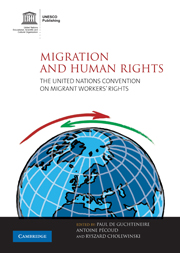Book contents
- Frontmatter
- Contents
- List of figures
- List of tables
- Notes on contributors
- Abbreviations
- 1 Introduction: The UN Convention on Migrant Workers' Rights
- PART I
- PART II
- 7 Obstacles to, and opportunities for, ratification of the ICRMW in Asia
- 8 Obstacles to ratification of the ICRMW in Canada
- 9 Mexico's role in promoting and implementing the ICRMW
- 10 Migrants' rights after apartheid: South African responses to the ICRMW
- 11 Policy on the ICRMW in the United Kingdom
- 12 The French political refusal on Europe's behalf
- 13 Migration and human rights in Germany
- 14 Migration and human rights in Italy: prospects for the ICRMW
- 15 The ICRMW and the European Union
- Annex 1 International Convention on the Protection of the Rights of All Migrant Workers and Members of Their Families Adopted by General Assembly Resolution 45/158 of 18 December 1990
- Annex 2 Ratifications of ILO Conventions 97 and 143 and of ICRMW as at June 2009
- Index
- References
15 - The ICRMW and the European Union
Published online by Cambridge University Press: 02 December 2010
- Frontmatter
- Contents
- List of figures
- List of tables
- Notes on contributors
- Abbreviations
- 1 Introduction: The UN Convention on Migrant Workers' Rights
- PART I
- PART II
- 7 Obstacles to, and opportunities for, ratification of the ICRMW in Asia
- 8 Obstacles to ratification of the ICRMW in Canada
- 9 Mexico's role in promoting and implementing the ICRMW
- 10 Migrants' rights after apartheid: South African responses to the ICRMW
- 11 Policy on the ICRMW in the United Kingdom
- 12 The French political refusal on Europe's behalf
- 13 Migration and human rights in Germany
- 14 Migration and human rights in Italy: prospects for the ICRMW
- 15 The ICRMW and the European Union
- Annex 1 International Convention on the Protection of the Rights of All Migrant Workers and Members of Their Families Adopted by General Assembly Resolution 45/158 of 18 December 1990
- Annex 2 Ratifications of ILO Conventions 97 and 143 and of ICRMW as at June 2009
- Index
- References
Summary
Introduction
Conceived in the 1970s, drafted in the 1980s and opened for ratification in the 1990s, paraphrasing Pécoud and de Guchteneire (2006, p. 252), the ICRMW finally entered into force on 1 July 2003. Despite the fact that it is viewed by the OHCHR as one of the eight core international human rights treaties, to date it boasts only forty-one States Parties – by some distance the lowest ratification level of any instrument in this category currently in force. This lack of support for the Convention from the international community becomes even more striking on consideration of the fact that not one single major labour destination country has yet ratified it – even those that have otherwise exemplary records (on paper at least) of support for international and regional human rights instruments, especially the Member States of the EU.
This chapter draws heavily on a report, commissioned by UNESCO and written by the present authors, which focuses on the reasons for non-ratification of the ICRMW, and the prospects for rectifying this, in seven countries of the European Economic Area (EEA): six EU Member States (France, Germany, Italy, Poland, Spain and the United Kingdom) and Norway. To put things in perspective, all the above states have ratified the other seven core international human-rights treaties currently in force and are, of course, parties to the ECHR.
- Type
- Chapter
- Information
- Migration and Human RightsThe United Nations Convention on Migrant Workers' Rights, pp. 360 - 392Publisher: Cambridge University PressPrint publication year: 2009
References
- 1
- Cited by



